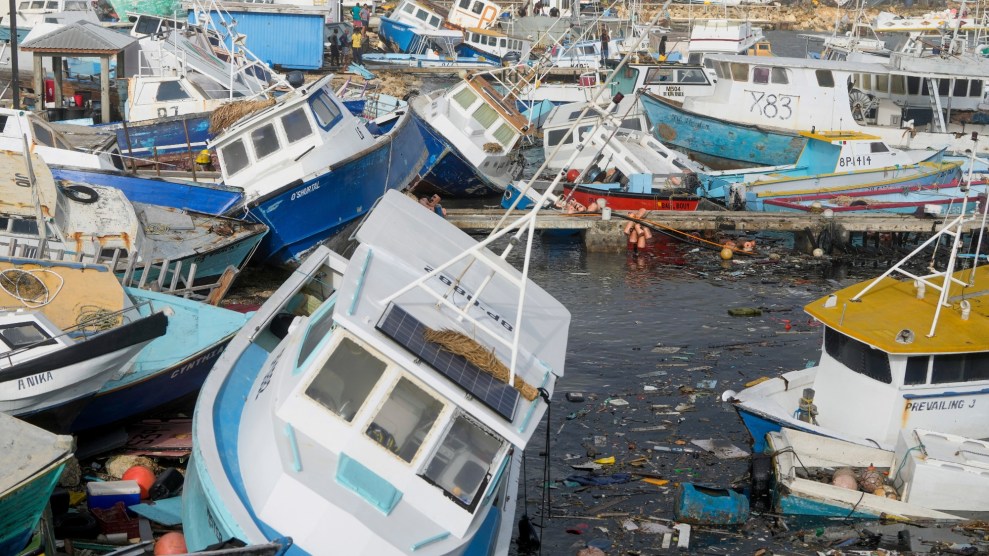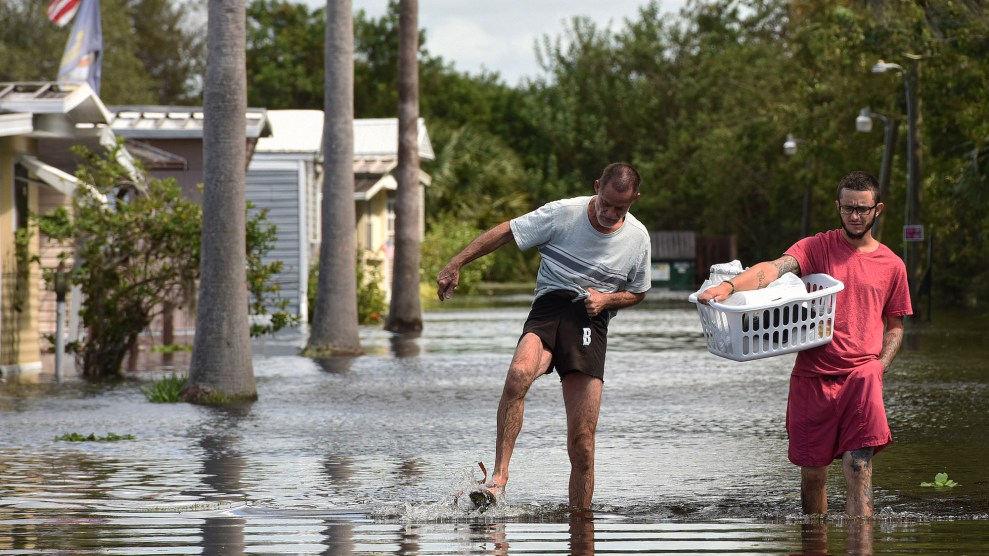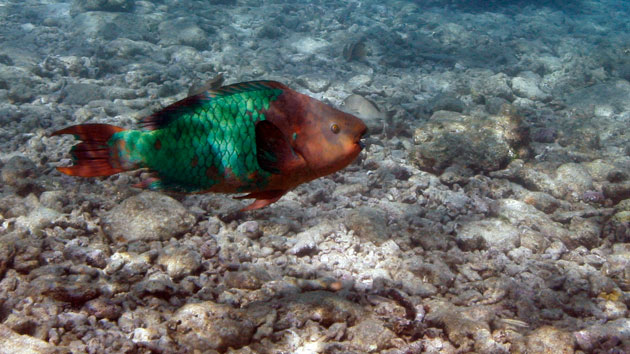
Fishing vessels damaged by Hurricane Beryl sit upended at the Bridgetown Fisheries in Barbados, Monday, July 1, 2024. Ricardo Mazalan/AP
This story was originally published by the Guardian and is reproduced here as part of the Climate Desk collaboration.
The prime minister of St. Vincent and the Grenadines (SVG) has decried a lack of political will in Western Europe and the US to tackle the global climate crisis as Hurricane Beryl has made landfall as an “extremely dangerous” category 4 storm.
Speaking from his residence in SVG on Monday, Ralph Gonsalves described the unfolding catastrophe as the “monster” storm ripped off rooftops, including that of the 204-year-old St George’s Anglican cathedral in the country’s capital, Kingstown.
“We have no electricity, and while I am talking to you, the rain is beating on the official prime minister’s residence, and the winds are howling. And it’s going to get much worse,” he said. “The coming hours are going to be horrendous.”
Torrential rain and gale-force winds downed power lines, smashed vehicles, and forced thousands into shelters. Videos posted on social media showed aluminum roofing sheets gliding through the air.
In a statement late Monday, Gonsalves said that on Union Island, 90 percent of houses had lost their roofs or been severely damaged.
Warning that there is worse to come, the US National Oceanic and Atmospheric Administration described Beryl as “life-threatening”.
Beryl strengthened from a tropical depression to a major hurricane in just 42 hours—a phenomenon recorded only six times before in Atlantic hurricane history.
By Sunday morning, countries across the eastern Caribbean, including SVG, Barbados, Grenada, and St Lucia, had been put on hurricane watch. Before the end of the day, a full-blown state of emergency declaration was issued on some islands, with curfews and restrictions on movement.
“For the major emitters of greenhouse gases, those who contribute most to global warning, you are getting a lot of talking, but you are not seeing a lot of action.”
Beryl has also grounded flights and forced the postponement of major events in the region, including the celebrations around the St Vincent Carnival and the 20-nation Caribbean Community (Caricom) leaders’ summit, which was scheduled for this week in Grenada.
Scientists say that human-caused climate breakdown has increased the occurrence of the most intense and destructive tropical storms because warming oceans provide more energy and increase their strength.
With the winds howling in the background, Gonsalves said:
“For the major emitters of greenhouse gases, those who contribute most to global warning, you are getting a lot of talking, but you are not seeing a lot of action—as in making money available to small-island developing states and other vulnerable countries.”
“I am hopeful that what is happening—and we are quite early in the hurricane season—will alert them to our vulnerabilities, our weaknesses and encourage them to honor the commitments they have made on a range of issues, from the Paris accord to the current time.”
SVG—which is still recovering from the effects of a major volcanic eruption in 2021—and neighboring Grenada are bearing the brunt of Hurricane Beryl. After the storm made landfall in Carriacou, one of the islands of Grenada, officials said they had received “reports of devastation”.
Gonsalves referred to COP, the annual UN climate change conference, as “largely a talk shop”.
He also pointed to the UK election campaign as an example of weak political will on climate action.
He said: “Climate change is not playing any major part in the campaigns. While you hear one or two people from the Labour Party talk about it and some concerns from the Greens, it is really not at the core of the messages from the major parties to the British people—for the simple reason that it is not an election winner one way or the other.
“The same thing is happening in other parts of the election in Western Europe and the United States as countries move to the right. It’s a terrible time for small-island developing states and vulnerable countries.”















